Brothers in Arms (Jack Steel 3) Read online
Page 4
At least the Duke of Burgundy, son of Louis, was not among them. Vendôme was sure the Prince, apparently sent to learn the art of war, had in fact been sent to spy on him. He had not seen eye to eye with the Sun King since Italy, Louis it seemed being more inclined to take the advice of the Elector, Max Emmanuel, than the most experienced and loyal of his generals. Continuing to eat, Vendôme spat out a piece of fat. Well, he thought, soon the King would see just how expert Vendôme was at the art of war. And then he would listen.
Somewhere out there with the enemy, Vendôme’s cousin, Prince Eugene of Savoy, was manoeuvring his troops with his master Marlborough, attempting to bring battle on their terms. But the Marshal was not overly concerned. Hadn’t he defeated Eugene three years ago at Cassano in Italy? If only that ass Burgundy were not with the French army now, and ostensibly his equal in rank. For the first time Vendôme sensed the faintest whisker of a possibility of defeat, but dared not let it invade his mind. At fifty-four years of age and after four decades with the colours he was well aware that state of mind was everything in command. He looked down at the dogs, begging for scraps. Their luck would hold, and his generalship. He must trust to fate and experience, and think positively.
The sound of approaching hoofbeats made him look up to see a horseman, an aide-de-camp to the staff by the look of it. The man had pulled up at the inn and, on foot now, was casting around for the commander in chief.
‘Marshal Vendôme?’
One of the Marshal’s own aides directed the boy towards him.
‘Sire, I bring an urgent request from General Biron. He is under attack, sire.’
Vendôme stared at the young man and grabbed the proffered dispatch. Wiping his greasy fingers on the tail of his grey coat, he opened the paper and began to read, muttering as he did so: ‘Allied units. English … Prussians. Large numbers.’ He paused. ‘What large numbers? Overwhelmed? Overwelmed by what? By how many?’
The young man stammered: ‘Why by … by the enemy, sire. The redcoats are there. Infantry and horse too. We are being pushed back. They have crossed the Scheldt at Oudenarde.’
Vendôme crushed the message into a small ball in the palm of his hand and muttered under his breath: ‘Oudenarde. I’d have taken it in two days and avoided all this.’ He frowned at the terrified aide and spoke louder. ‘Biron is asking me for reinforcements, is he not? Well, you may tell General Biron that the Allied army is nowhere near us. If they are anywhere near his positions then the devil must have carried them there, for such a march is impossible.’
The aide, unsure what to do, decided magnanimously that the probable sacrifice of his military career was justified by saving thousands of French lives. He shook his head and stood his ground. ‘I beg you, sire. Look again to the south. I swear to you, sire, the Allied army is there, at least a considerable part of it. A full vanguard of redcoats, sire. Foot and horse, with artillery too. They are pushing us back from Oudenarde. They have already seen off a regiment of Swiss foot and will surely be doing us more damage as we speak.’
Vendôme cursed the man under his breath, but he had not been a soldier for thirty-six years and a score of them a general not to know when it was prudent to take advice. Putting down his goblet of wine, he grabbed another chicken leg and walked across the road, past where the officers were conferring, to the crest of the hill.
What he saw on the low horizon stopped him in his tracks and nearly made him choke on his mouthful of chicken. Below him in the valley of the Scheldt a huge dust storm appeared to have arisen. Vendôme might have been confident, but he was no fool. He knew the signs of an army and of unavoidable battle when he saw them. He swore, turned quickly and walked smartly back to the messenger.
‘Thank you. I’m sorry to have doubted you, Lieutenant. Yes, I do see now. Take a message to General Biron at Heurne. Tell him not to worry. He must attack the force to his front with all possible speed. I myself shall lead the cavalry to our left wing in support. Wait there a moment.’ He looked across to the group of officers. ‘Puységur.’
Vendôme’s Chief of Staff walked across.
‘Puységur, go with this officer. You’re to ride to General Biron. Order him to stand where he is for the moment. We have insufficient cavalry in his vicinity to offer immediate support. He is to wait for the horse before he advances any further. And be sure to tell him that he may allow their great general Marlbrook to come across with as many of the enemy as he likes.’
Both the Chief of Staff and the courier looked askance.
Vendôme continued: ‘Don’t look so bemused, gentlemen. It is all part of my plan to trap the enemy. Now go.’
He called to his private secretary. ‘Du Capistron. Take a message to my lord Burgundy. He must move the infantry of the entire left wing directly behind my advance with the horse.’
Vendôme crossed to the table and took a swig of the wine he had abandoned. He patted one of the dogs and smiled as he congratulated himself on his swift action. For once Marlborough had blundered. If Vendôme could act now he would trap him and a good deal of his army on the wrong side of the Scheldt. Pin him down with superior numbers and the natural obstacle of the river at his back. At the very least he would drive them back over their bridges and into the Scheldt. And all that his generals had to do was to act together. Surely that was not too much to ask of anyone? Even of that idiot Burgundy?
A large black fly had settled on a morsel of the bread on his plate, and picking up a huge pewter ladle from the table he brought it down on the insect, squashing it into the metal. He would crush this Allied vanguard just as easily as he had killed that fly. And then, before my lord Marlbrook could reinforce his ailing line he, Vendôme, would be in command of the river and its strongpoints. Then their great British general would be routed from the field and a grateful King would surely reward his wholly forgiven and ever-faithful Marshal.
Vendôme turned to the group of officers. ‘Come, gentlemen. Chevalier, if you please. D’Evreux. All of you. This is no time for lunch or gossip. Dinner is at an end. Come on. We have much work to do and a battle to win.’
There can be few more spectacular sights on any field of battle than that of a brigade of cavalry in full cry, and Steel was thankful for the diversion. With the French gunners having gauged their range, his men were beginning to suffer more than the psychological hurt of their tortured minds which had plagued them for the last few hours of waiting on this hill. Now at least there was something to offer them as amusement.
Steel and Slaughter, Hansam, Williams and as many of the company as were able to find a suitable vantage point watched, with the rest of the battalion’s front rank and other regiments close to the front of the brigade, as from the Allied left wing rank upon rank of high-stepping cavalry broke out across the field. They advanced sedately at first, at a slow trot, and then, when their intention became evident to the enemy, broke into a canter and a gallop, coming on steadily towards the French right flank.
Steel looked towards their goal and saw, sitting quite still and apparently unaware across the Ghent road, a glorious body of French cavalry; dragoons and horse in elaborate blue and red coats. They seemed utterly oblivious to the men moving towards them at an increasing pace. Steel could only assume that they had been informed by their commander that the ground to their right was impassable. The Frenchmen must have seen the Hanoverian horse assembling to begin their advance. He pictured their squadron commanders, sitting high and proud on some of the finest horses to be found in France, laughing in genial conversation, although they must have been quite aware of the movement on their flank. He watched them. He too had gauged the lie of the land and had noticed the marshes that ringed the position, presuming them impassable.
He found Williams and Hansam standing at his side. ‘Well, gentlemen, what d’you make of that then? Have our generals gone quite mad? First they keep us here the best part of the day, and now it seems they intend to send the best of our cavalry into a bog.’
W
illiams, apparently ignoring or unaware of Steel’s comments, spoke with curious and undisguised reverence as he stared at the cavalry’s advance. ‘It’s quite brilliant. Incredible.’
Steel looked at him quizzically. ‘Tom? Is it catching, this madness? Don’t bring it near me. What the devil are you talking about? You can see as well as I that that ground is utterly unsuited to cavalry. It’s a marsh, for God’s sake. Why, even the foot would be hard pressed to pass through that quagmire. It’s madness.’
Williams spoke in a tone appropriate to his junior position, yet firm in its purpose. ‘No, sir, it’s not mad. You see, that marsh is not what it seems. I had the truth of it this morning from Harrington. I don’t think you know him. He’s a cornet in Hay’s Dragoons, attached to the staff. Sound fellow.’
‘Get on with it.’
‘Sorry, sir. Fact is, though, it’s firm ground. As firm as that on which we stand ourselves.’ He stamped his foot. ‘It merely looks like a bog from the sheen of water that it keeps on its surface. Like oil floating in a bath, if you know what I mean.’
Steel stared at him and wondered quite when the young man had taken a bath in scented oils.
Williams continued. ‘Harrington says the engineers told him it could support a train of artillery and more. It’s brilliant, sir. D’you see? For the French are not aware of the truth of the matter. They’ll be cut to ribbons.’
Steel looked again and saw that now several of the French cavalry officers were pointing in the direction of the advancing Germans. They were laughing. He presumed that they would be mocking the decision of the Hanoverian commander to send his horse into a marsh. ‘Christ almighty. You’re right. Look at them, Henry. They don’t know. Haven’t a clue. They’ll be caught off their guard. D’you see? It is brilliant. Well done, Tom.’
The Hanoverian horse were advancing at the gallop now, for, as usual on the field, the sheer weight of man and horse together did not allow them to break into a full charge. But Steel knew that they would still have more than sufficient momentum to smash into the French line with full effect. The French for their part still had not moved, even though the enemy were now apparently crossing the impassable marsh. As Steel looked on, though, he noticed some of the French officers beginning to turn their horses away from the assembly and to rejoin their squadrons and troops. Within a few moments he realized that the French would learn the salient lesson that in battle there can never be any substitute for diligent intelligence. It was a lesson that would cost many of them their lives.
He recognized the Hanoverians now, General Jørgen Rantzau’s brigade of dragoons, part of Cadogan’s own command, a blaze of white-uniformed German mercenaries in English pay whom he knew bore no love for the French or their Swiss allies stationed behind them, all of them mounted uniformly on huge bay horses. Eight squadrons of Hanoverian horse, some twelve hundred men. A sparkle of flashing light caught his eye, and Steel saw the sun glint off the long, straight cavalry swords which rested on their right shoulders, honed, he guessed, to an edge like a butcher’s cleaver and constructed specifically so that the slightest motion exerted at the hilt might make the blade fall like a hammer on whatever lay below: flesh, bone or sinew. He looked on, horribly fascinated, as the Hanoverian horse closed with the French, who still had not moved. He watched closely and saw the final moment at which the French at last realized their peril. He kept looking as in a horrible instant there was a commotion in their still static ranks. He saw the sudden movements as the unflappable officers screamed useless commands to wheel to the right, to face the oncoming enemy. To draw sabres. But it was too little and too late to save the French, and now, as the white-coated Hanoverians on the big horses drove on relentlessly, the final act of horror unfolded before him.
A noise burst across the valley, which to the new recruits in the regiment sounded curiously like the crackle of a fire in a hearth. Steel recognized it instantly as the sound of musketry. Two hundred muskets had opened up from a battalion of French infantry arrayed in line to the right of the cantering Hanoverian dragoons. They sang out in a concerted volley, belching smoke and flame, and a few of the Hanoverians seemed to leap in the saddle as they were struck and toppled from their mounts, a fair number of which also went down in the hail of bullets. But the volley had less effect than it might have done due to the pace of the fast-moving horsemen who rode on oblivious, for such now was their fury that most did not even notice the musketry any more than one might acknowledge the annoying bite of a mosquito. Steel watched as the dragoons kept going in their headlong rush, drawing ever closer to the panic-stricken target of the French horse astride the road. This, he thought, was precisely what these men had been trained to do. This was the moment of which any horseman and dragoon dreamed but never believed would actually happen – to find an army’s weakness, catch it off guard and exploit it at speed. It was textbook stuff and almost unbelievably simple, and when executed properly, as here, imbued with a savage grace.
Then Rantzau’s men were up and in the French lines, scattering the enemy in all directions, moving through them like a scythe through corn, their huge blades falling relentlessly on skulls and necks and, held á point, skewering troopers where they sat helpless while the attackers’ horses kicked and flared their nostrils and bit at the enemy’s chargers, and even the riderless mounts of the men who had fallen still bowled into the French and added their weight and fury to the chaos and carnage of the mêlée.
Steel could hear his men cheering now as they watched the enemy in their death agonies. There was no room for mercy in war, he thought. No pity here, now. There were merely winners and losers – the dead, the dying and those who managed to remain alive for one more day. The French cavalry were lost. Twenty squadrons of them were swept to oblivion because of one man’s refusal to admit that he might have been wrong. As Steel watched, the blue and red ranks simply seemed to melt away in a mayhem of screaming bodies and whinnying horses, while the great white wedge of the Hanoverians pushed further into them like a hot knife going into butter. And still the blades rose and fell, trailing gouts of blood as they went. Beneath the hooves of French cavalry that only a few minutes earlier had looked so proud and confident, patches of ground had turned to a red paste. It did not take long for Rantzau’s men to push through the bloody ruin of the cavalry, then they were out and in search of fresh quarry. And to Steel’s horror they did not stop.
Of course, he thought, they were dragoons, and they were only doing what dragoons did best. Get into the enemy on as unequal terms as you can, and then hack them to pieces until the blood runs free. He knew Jørgen Rantzau to be a brave and experienced soldier. But however well led any cavalry might be, however fearless, how could you control such men once their blood was up? Then no amount of shouted orders, no bugle calls could stop them. So Steel watched as the inevitable happened and Rantzau’s blood-crazed victors were countercharged by fresh French cavalry. The now panicked Hanoverian squadrons attempted to reform, only to be caught in the flank. Unable to stop himself, Steel stood transfixed by their nemesis.
There was a cough from his side. ‘Now that’s what I’d call a bloody shame, sir, if you don’t mind my saying so. But that’s cavalry for you. See, sir, they don’t know when to stop. But what a show they put on, eh, sir? That German cavalry. Really beat up the French. We all saw it back there. Bloody marvellous.’
‘Yes, bloody marvellous, Jacob. You’re right there. And you’re right about the cavalry. They don’t know when to stop. Same with our lot, mind you. Remember Hay’s dragoons after the Schellenberg? Roaring down that hill towards the town? The Danube ran red with enemy blood.’ He smiled, ‘But you’re a fine one to talk of restraint, Sar’nt. In our day we’ve not been much better. After Ramillies I thought the whole bloody company was going to chase the Frenchies back to Paris.’
Slaughter grinned. ‘Well, sir, sometimes you just can’t hold them. Aye, and we would’ve done that too, if the Duke hisself hadn’t stopped us. But we’ll do it
today, sir. Chase ’em to Paris if you tell us to. If we ever get the chance, that is. Right to the gates of bloody Paris and down that ruddy river to Versailles. And give old Louis a bleeding nose.’
He might not have been far wrong, thought Steel. France was only fifteen miles away. If they could really prevail here today, if fate was kind to them, and for the last few years the gods of war certainly seemed to have been on their side, there was just the chance that some time soon he might be leading his men into Paris in a victory march. And what a day that would be. He laughed with the sergeant. ‘Let’s hope so, Jacob. All we can do now is hope.’
He looked again across the river. To his astonishment it appeared that the French, emboldened by their success against the repulsed Hanoverians, many of whom thankfully appeared to have managed to retire in good order to the Allied left, had begun to counterattack down the Ghent road, towards Oudenarde.
He shook his head. ‘What on earth do they mean now? Can’t they see we’re here in force?’
Both men watched as four huge columns of pale-grey-uniformed French infantry crossed the little stream of the Diepenbeek and without any opposition took the village of the same name which lay to Cadogan’s left. Steel could make out more detail among the French now. He could see their officers and sergeants quite clearly with their spear-tipped spontoons and axe-headed halberds and the frothy confections of white and silver lace in their black tricorns. The French were getting close, being drawn into Cadogan’s cauldron. At once both men guessed that their time had come at last.
‘Stand the men to, Sar’nt. I believe that we may be about to advance.’
It was approaching four o’clock by Hansam’s pocket watch and, as he had suspected, Steel did not have long to wait. Even as Slaughter and the other company sergeants were busy herding the men back into neat files, he saw a galloper from the high command racing along the hillside, making for the towering figure of Colonel Farquharson. Finding his path impeded by the sheer volume of men waiting in the column, the rider pulled up short and Steel heard the boy’s shouted words high on the breeze.

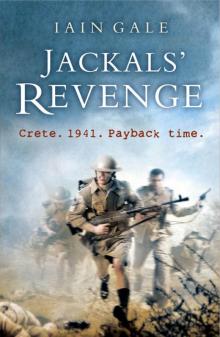 Jackals' Revenge
Jackals' Revenge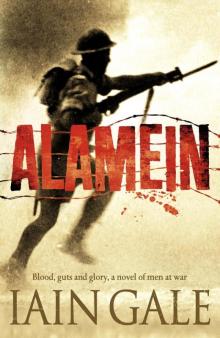 Alamein
Alamein Conspiracy
Conspiracy Four Days in June
Four Days in June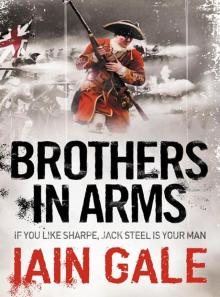 Brothers in Arms (Jack Steel 3)
Brothers in Arms (Jack Steel 3) Brothers in Arms
Brothers in Arms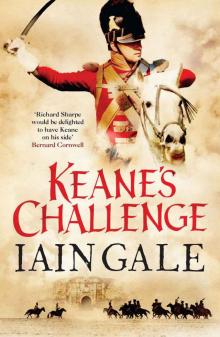 02 - Keane's Challenge
02 - Keane's Challenge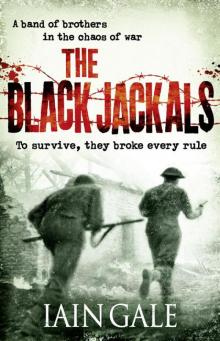 The Black Jackals
The Black Jackals Man of Honour
Man of Honour Rules of War
Rules of War